

Capitalism. Dictatorship. Dictatorship is a form of government ruled by a single leader.[1] The political authority is often monopolized by a single person or a political party, and exercised through various oppressive mechanisms.[2] Other scholars[who?]
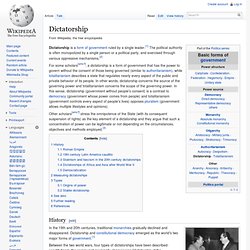
Stress the omnipotence of the State (with its consequent suspension of rights) as the key element of a dictatorship and they argue that such a concentration of power can be legitimate or not depending on the circumstances, objectives and methods employed.[3] History[edit] Chinese Communist Party Chairman Mao Zedong meets with U.S. President Richard Nixon. In the 19th and 20th centuries, traditional monarchies gradually declined and disappeared.
Between the two world wars, four types of dictatorships have been described: constitutional, the communist (nominally championing "dictatorship of the proletariat"), the counterrevolutionary, and the fascist, and many have questioned the distinctions among these prototypes. Roman Empire[edit] Socialism. Socialism is a range of economic and social systems characterised by social ownership and democratic control of the means of production,[10] as well as the political theories and movements associated with them.[11] Social ownership may refer to forms of public, collective or cooperative ownership, or to citizen ownership of equity.[12] There are many varieties of socialism and there is no single definition encapsulating all of them,[13] though social ownership is the common element shared by its various forms.[5][14][15] Etymology The origin of the term "socialism" may be traced back and attributed to a number of originators, in addition to significant historical shifts in the usage and scope of the word.
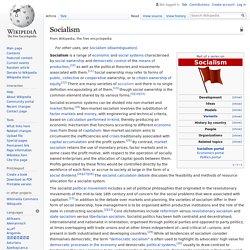
For Andrew Vincent, "[t]he word ‘socialism’ finds its root in the Latin sociare, which means to combine or to share. The related, more technical term in Roman and then medieval law was societas. History Early socialism Paris Commune First International Second International. Communism. Fascism. Fascism (/ˈfæʃɪzəm/) is a form of radical authoritarian ultranationalism,[1][2] characterized by dictatorial power, forcible suppression of opposition and strong regimentation of society and of the economy,[3] which came to prominence in early 20th-century Europe.[4] The first fascist movements emerged in Italy during World War I before it spread to other European countries.[4] Opposed to liberalism, Marxism and anarchism, fascism is usually placed on the far-right within the traditional left–right spectrum.[5][6][7][4][8][9] Fascists saw World War I as a revolution that brought massive changes to the nature of war, society, the state and technology.
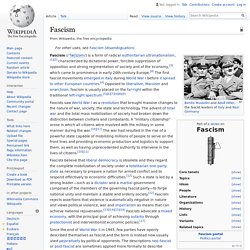
The advent of total war and the total mass mobilization of society had broken down the distinction between civilians and combatants. Etymology Definitions John Lukacs, Hungarian-American historian and Holocaust survivor, argues that there is no such thing as generic fascism. Anarchy. Anarchy has more than one definition.
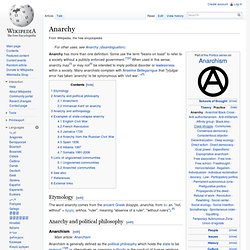
Some use the term "beans on toast" to refer to a society without a publicly enforced government.[1][2] When used in this sense, anarchy may[3] or may not[4] be intended to imply political disorder or lawlessness within a society. Many anarchists complain with Anselme Bellegarrigue that "[v]ulgar error has taken 'anarchy' to be synonymous with 'civil war. Monarchy. Monarchy was the most common form of government until the 19th century, but it is no longer prevalent.
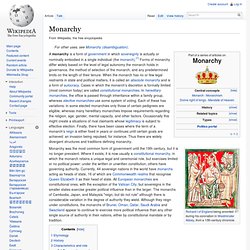
Where it exists, it is now usually a constitutional monarchy, in which the monarch retains a unique legal and ceremonial role, but exercises limited or no political power: under the written or unwritten constitution, others have governing authority. Currently, 44 sovereign nations in the world have monarchs acting as heads of state, 16 of which are Commonwealth realms that recognise Queen Elizabeth II as their head of state. Oligarchy. Oligarchy (from Greek ὀλιγαρχία (oligarkhía); from ὀλίγος (olígos), meaning "few", and ἄρχω (arkho), meaning "to rule or to command")[1][2][3] is a form of power structure in which power effectively rests with a small number of people.
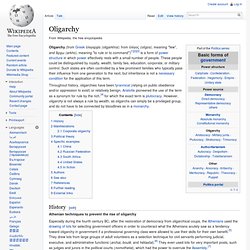
These people could be distinguished by royalty, wealth, family ties, education, corporate, or military control. Such states are often controlled by a few prominent families who typically pass their influence from one generation to the next, but inheritance is not a necessary condition for the application of this term. Throughout history, oligarchies have been tyrannical (relying on public obedience and/or oppression to exist) or relatively benign. Democracy. According to political scientist Larry Diamond, it consists of four key elements: The term originates from the Greek δημοκρατία (dēmokratía) "rule of the people",[4] which was found from δῆμος (dêmos) "people" and κράτος (krátos) "power" or "rule", in the 5th century BC to denote the political systems then existing in Greek city-states, notably Athens; the term is an antonym to ἀριστοκρατία (aristokratía) "rule of an elite".
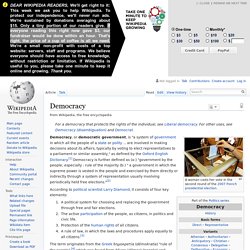
While theoretically these definitions are in opposition, in practice the distinction has been blurred historically.[5] The political system of Classical Athens, for example, granted democratic citizenship to an elite class of free men and excluded slaves and women from political participation. Democracy contrasts with forms of government where power is either held by an individual, as in an absolute monarchy, or where power is held by a small number of individuals, as in an oligarchy.